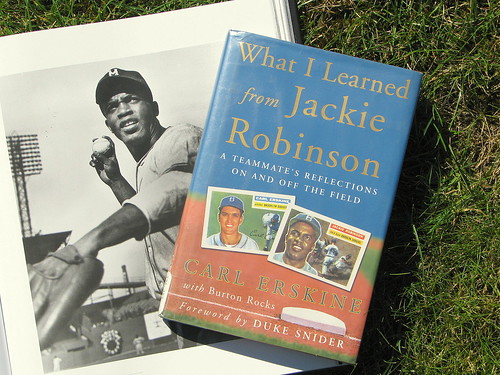 Jackie Robinson looms large in this little book, but it’s not really about him. What I Learned From Jackie Robinson is the autobiography of Carl Erskine, one of Robinson’s teammates. Erskine was a star pitcher in his own right (he threw two no-hitters — I’d say that qualifies him as a star) but was only one hero among the star-laden Brooklyn Dodgers teams of the 1950s. My dad grew up in Brooklyn; my mom in the Bronx. He was a Dodger fan, she rooted for the Giants. I’m a native Washingtonian, but enjoyed reading about that cross-town rivalry in the book — albeit from Erskine’s obvious Dodger slant.
Jackie Robinson looms large in this little book, but it’s not really about him. What I Learned From Jackie Robinson is the autobiography of Carl Erskine, one of Robinson’s teammates. Erskine was a star pitcher in his own right (he threw two no-hitters — I’d say that qualifies him as a star) but was only one hero among the star-laden Brooklyn Dodgers teams of the 1950s. My dad grew up in Brooklyn; my mom in the Bronx. He was a Dodger fan, she rooted for the Giants. I’m a native Washingtonian, but enjoyed reading about that cross-town rivalry in the book — albeit from Erskine’s obvious Dodger slant.
But as the title suggests, the book is not all baseball. Most of Erskine’s narrative takes place off the field. He gives us brief insights into clubhouse shenanigans, relationships, including, of course, that of his long-time catcher Roy Campenella, and the hero of the age Jackie Robinson.
General manager Branch Rickey signed Robinson to the big leagues only after watching him for more than a year in the Dodger’s farm system. He wanted to know more about Robinson’s character, his mettle. Rickey knew the first African American to integrate major league baseball would have to be tough — able to withstand pressures, injustices, racial indignities, and insults. He was right. But he also found the right man to do it. Number 42. Erskine relates many times when Robinson was mistreated, prohibited from segregated hotels, and played in stadiums with racially separated bleachers.
Robinson had to stifle his anger for those early years, but was somehow able to channel the negatives into positives. His strength of character, excellence, and class transcended the ugliness that stalked him. Erskine described Robinson as a team leader and a very nurturing presence on the team, encouraging players at every turn even while so many outside the clubhouse were disparaging him. He had to overcome so much just to do the thing he loved: play baseball. How he succeeded on a daily basis, Erskine wonders, “is mind-boggling. Most men would have cracked.”
As I said, the author’s life is the focus in this modest little book, but Robinson gets the attention whenever he’s involved. Erskine had a deep respect for his teammate and it’s clear that he wanted the man remembered for more than his number.
By the way: This memoir reminded me of The Teammates by David Halberstam, a book I read a couple years ago about Ted Williams and his former teammates when age and illness brought them back together. It’s a touching book and Halberstam’s writing should not be missed.
PHOTO © Steve Campion

